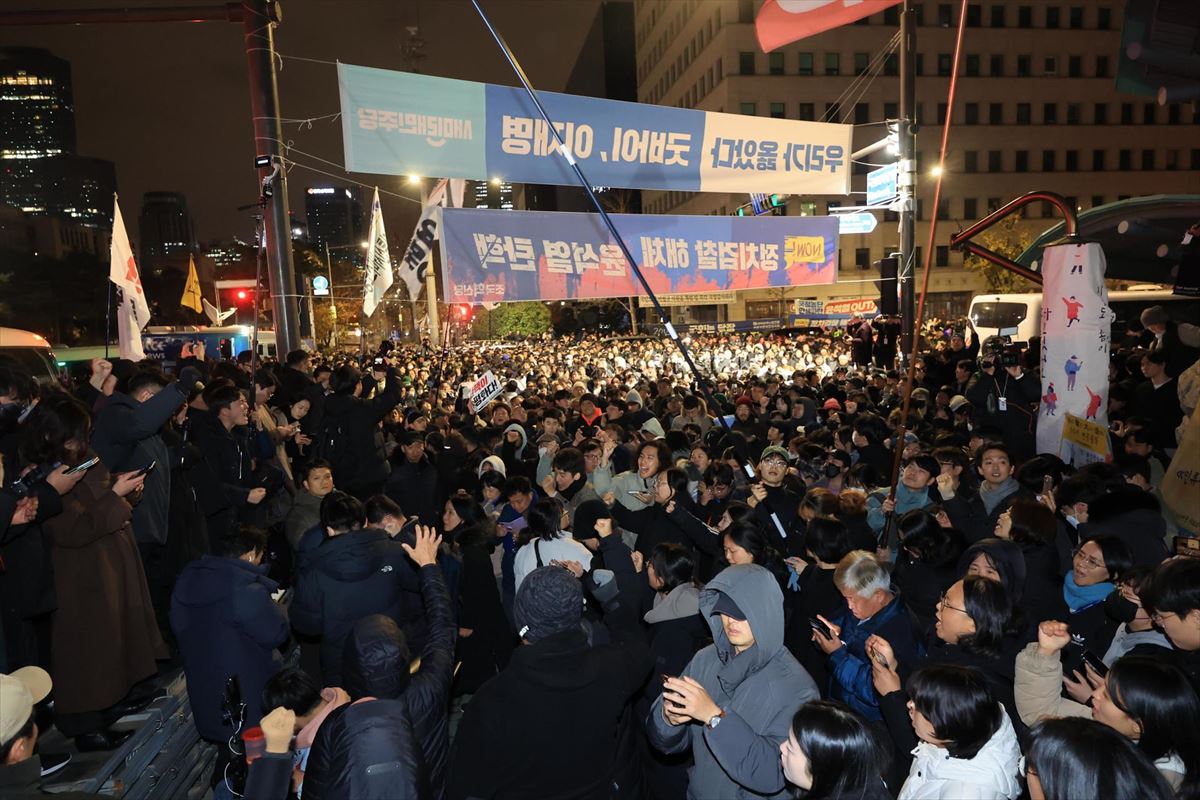The Democratic Party (DP) and five other parties have started the parliamentary process that could lead to the suspension of President Yoon Suk-yeol, whose party governs in a minority.
South Korea’s main opposition force, the Democratic Party (PD), and five other parties this Wednesday filed a parliamentary motion for the dismissal of the President Yoon Suk-yeolafter the political storm created in the country by the declaration of martial law that has already been revoked.
The six opposition parties have thus started the parliamentary process that could lead to the departure of President Yoon Suk-yeol, whose party governs as a minority.
The impeachment motion there could be a vote Friday the 6th or Saturday the 7thwithin the 72-hour period established by national regulations to process these types of initiatives once submitted.
Approval would require the support of at least 200 of the 300 seats that make up South Korea’s unicameral legislature.
Five hours of martial law
The President of South Korea, Yoon Suk Yeolpicked up late this Tuesday martial law after the PD and other minority forces overturned the controversial measure in the National Assembly, which was issued with the aim of “wiping out forces linked to North Korea.”
The controversial measure comes after the PD, which has a majority in the National Assembly (Parliament), passed a 2025 general budget with multiple cuts without the support of Yoon’s ruling People’s Power Party (PPP), in addition to motions to appoint the Attorney General and the head of the Audit and Inspection Council, charged with monitoring the accounts of public organizations.
Yoon launched these accusations against the PD, which had a majority in the National Assembly and which had caused trouble for his government by approving 2025 general budgets with multiple cuts without the support of the ruling People’s Power Party (PPP). . of motions to remove the Attorney General and the person responsible for overseeing the accounts of government agencies.
The Constitution grants the president the power to declare martial law due to “military exigencies” or to “maintain public security and order,” but also stipulates that he must inform the Assembly of this decision. If Parliament requires this by a majority, the President must withdraw. , get the Article 77 of the Magna Carta.
The South Korean president had accused the political opposition of engaging in “anti-state activities.” In a televised speech, the president had said the opposition was “carrying out activities that plan rebellion.”
More specifically, Suk Yeol had declared martial law “to protect the constitutional order” against “anti-state” activities, which the president accuses the main opposition bloc, the Democratic Party (PD), which he calls “pro-North Korean forces’. ‘ in a television statement.
For his part, the opposition leader Lee Jae Myungsaid that “the president has betrayed the South Korean people.” Furthermore, he stated that “from this moment on, Yoon Suk-yeol is no longer the president of the country.”

Shortly afterwards, the South Korean National Assembly voted in favor lift martial law during an extraordinary plenary session shortly after Suk Yeol announced this exceptional measure, with thousands of people protesting on the streets of Seoul.
During the plenary session, the opposition forces that dominate the chamber approved the repeal of martial law by 190 votes in favor. Under the South Korean constitution, the president is obliged to revoke that measure.
The vote took place while thousands of people They gathered in front of the National Assembly to protest the declaration of martial law, and South Korean forces attempted to seize the legislature’s headquarters under that emergency measure.
Source: EITB
I’m Wayne Wickman, a professional journalist and author for Today Times Live. My specialty is covering global news and current events, offering readers a unique perspective on the world’s most pressing issues. I’m passionate about storytelling and helping people stay informed on the goings-on of our planet.



